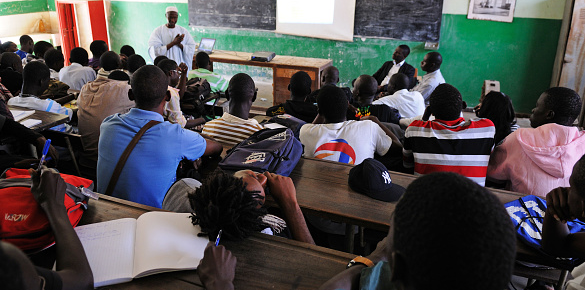You have /5 articles left.
Sign up for a free account or log in.

A high school in Dakar, Senegal
Andia / Getty Images
PHILADELPHIA -- Since 2011, American colleges and universities have seen a 7 percent increase in the number of students they enroll from Africa. The total is just under 38,000, led by the nearly 12,000 students who come from Nigeria.
By contrast, American colleges enroll more than 350,000 students from China (the top international provider) and more than 185,000 from India (the runner-up). Speakers at the annual meeting of NAFSA: Association of International Educators last month told college officials from the United States that they have the potential to find much more talent in Africa than they have to date. Many countries in Africa send only a few hundred or a few thousand students, even though many others are qualified.
Susan D. Knowles of the EducationUSA office in Durban, South Africa, said American colleges need to remember that Africa has evolved significantly from the out-of-date images many Americans still have of a region of poverty and instability. Amid the poverty that remains real, Knowles said, is a continent with one of the fastest economic growth rates in the world, expected to soon have one billion members of the middle class. With 40 percent of Africans between the ages of 15 and 24, many would love a higher education in the United States, she said. Only 6 percent of Africans who educators say could benefit from higher education have the opportunity to go to college, Knowles said, lamenting "the waste" of so much brainpower.
Knowles and others shared tips on how American colleges can identify and recruit talent.
Don't expect full-pay students. While some African parents can afford to contribute to their children's higher education bills, the education environment is very different from that in China and India, where many parents don't blink at paying full freight at American colleges. "You have to commit to scholarships," said Samba Dieng, director of the Office of International Students and Scholars at Lehigh University. "You can't assume you will find students who will pay $50,000 a year. African students can't pay $50,000 a year." Dieng said he realized that getting college leaders to provide the money for scholarships was a challenge. For others, he said, admissions and international officials need to fight the conception that "all African kids are running around with flies in their mouths."
Remember that African high schools don't have American-style grade inflation. Knowles said that, in many South African schools, an average of 80 would be the equivalent of an A, earned only by top students. Dieng said that Senegal uses a scale of 0-20, based on the French baccalauréat system. But he said that "20 is reserved for God," and from 14 up would indicate an outstanding student. For admissions officials in the United States, used to adjusted grade point averages in the U.S. where everyone seems to have a 4.3, the absence of grade inflation can be a shock.
Be flexible on testing in Francophone Africa. Several speakers said that very intelligent students who didn't grow up with English as their primary language can't make sense of the SAT and ACT, which aren't organized in ways that they understand (leaving aside issues of language). These speakers said that they understood the need to require the TOEFL or IELTS, but suggested that colleges rely on those tests, combined with high school transcripts, rather than on the standardized tests typically used in college admissions.
Brochures still matter. African students, like their American counterparts, rely on mobile devices. But many are exposed to American colleges by browsing through brochures at EducationUSA offices (which are sponsored throughout the world by the U.S. State Department). Dieng, who grew up in Senegal, said a brochure from the University of Nebraska at Lincoln set him on a path toward that campus.
Start with a few countries. American admissions recruiters used to road trips that cover 12 states need to plan for visiting just a few places, experts here said, as travel within African can be difficult and unpredictable.
Aim for a critical mass. Several said that African students don't want to be the only African student and are likely to be more open to attending a college where they won't be.
The Trump Impact?
During the formal presentations here, no mention was made of President Trump, who used a vulgarity to describe African nations earlier this year.
Asked about the issue, speakers noted that several kinds of questions (not explicitly mentioning the president) have become more common under the current administration.
One is an increased number of questions about safety. The other is increased questions about racism.
Kate Dobson, assistant director of international admissions at Indiana University-Purdue University in Indianapolis, said she thinks questions about racism may "be code" for asking about the current political environment in the U.S.
Her response is not to try to defend the administration, but to match prospective students with those from Africa already enrolled. They may be best able to describe the welcoming atmosphere of many American colleges, she said.
While political questions may make recruiting in Africa more difficult now than in the past, interest here was high. The session was standing room only.








